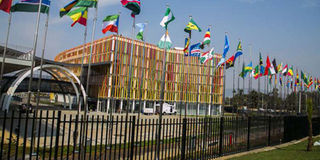Doubts raised on election of Africa Union boss as leaders meet in Rwanda

The Kigali Conventional Centre in Rwanda, which is hosting the 27th African Union Summit from 10th to 18th July, 2016. PHOTO | CYRIL NDEGEYA | NATION MEDIA GROUP
What you need to know:
- Amid reports that the candidates who have offered themselves for election for the AU Commission chairmanship do not have the required pedigree, there have been doubts about the election taking place as planned after calls were made for postponement.
- On Sunday, the tiny West African island nation of São Tomé and Príncipe will hold a general election.
The heads of state of the African Union (AU) will meet in Kigali, Rwanda on Sunday to, hopefully, oversee the election of office holders of the the AU Commission, including a chairperson and their deputy.
Also up for grabs are four positions for commissioners to head the infrastructure and energy, rural economy and agriculture, political affairs and human resources and science and technology committees.
Amid reports that the candidates who have offered themselves for election for the AU Commission chairmanship do not have the required pedigree, there have been doubts about the election taking place as planned after calls were made for postponement.
The AU conference aside, Sunday will see the holding of a general election in the tiny West African island nation of São Tomé and Príncipe, which gained independence from Portugal in 1975.
The election, in the rather obscure country, epitomises the continuing struggle for democracy in Africa, and will spark a new round of polls, including Zambia on August 10, and the Gabon one slated for August 27.
In the latter country, President Ali Bongo Ondimba recently announced his candidature.
He was elected for a first term in a disputed 2009 vote following the death of his father Omar Bongo.
The latter ruled Gabon for 41 years, steering the oil-rich country from 1967. The incumbent is seeking to perpetuate his family's dynasty.
In São Tomé and Príncipe, 92,760 people are expected to vote in Sunday’s election. Twelve parties are competing for the available positions.
According to the latest media reports, voters will be electing 55 members of the national assembly and councillors to six municipalities, along with the seven deputies to the legislative assembly of the autonomous region of Príncipe.
The presidential election has attracted five candidates. The winner is chosen using a two-round system. The poll will see President Manuel Pinto da Costa, 79, fighting it off with two main challengers.
RULED THERE
President da Costa ruled the country between 1975 and 1991 and returned to power again after winning 52.8 per cent of the vote in a run-off in August 2011.
He is running for a new term on the ticket of the São Tomé and Príncipe Liberation Movement, Social Democrat Party, and is also said to be backed by the Union for Democracy and Development party.
His challengers are MP Evaristo Carvalho and Maria das Neves, who has been serving as parliament’s deputy speaker. Carvallo lost the 2011 election while Neves is a former premier and is running on a Democratic Movement Force for Change ticket. The other candidates are Manuel do Rosário and economist Hélder Barros.
Back to the AU Commission chairmanship election, suspicions have been raised that the three frontrunners could come with baggage.
Ugandan candidate Specioza Kazibwe, for instance, is perceived to be too close to the country’s veteran president Yoweri Kaguta Museveni.
The latter ranks among Africa’s multi-term leaders and Kazibwe’s detractors fear that her win could result in Museveni having undue influence over the commission.
For Equatorial Guinea’s candidate Agapito Mba Mokuy, 51, concern has been expressed that should he be elected to the position, the poor human rights record of his country’s leader, Teodoro Obiang’ Nguema Mbasongo, could reflect badly on the continent.
As for Botswana’s candidate Pelonomi Venson-Moitoi, murmurs doing rounds are that her country has often been opposed to some AU positions, including the organisation’s stand about possible withdrawal from the International Criminal Court. Moreover, over the years President Ian Khama has given the AU a wide berth.





